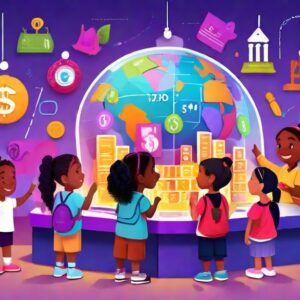In today’s society, financial literacy has become more crucial than ever before. According to recent studies, nearly 80% of Americans carry some form of debt, hindering their ability to achieve financial freedom.
However, by acquiring the necessary knowledge and skills in personal finance, individuals can break free from the cycle of debt and embark on a journey towards building wealth.
This article explores the transformative power of financial literacy, shedding light on how it can empower individuals to take control of their financial lives and unlock a path to prosperity.

Key Takeaways
- Financial education equips individuals with the necessary skills and knowledge to make informed financial decisions.
- Creating a detailed budget prioritizes debt repayment and tracks progress.
- Developing a comprehensive financial plan helps individuals set clear goals, create budgets, and make informed investment decisions.
- Diversifying income streams through side businesses, investments, or passive income sources increases earning potential and builds wealth.
The Importance of Financial Education
Financial education plays a crucial role in empowering individuals with the necessary skills and knowledge to make informed financial decisions. In today’s complex world, where financial markets are constantly evolving and economic uncertainties abound, it is essential for individuals to be equipped with the tools and understanding to navigate the financial landscape.
By providing individuals with education on budgeting, saving, investing, and debt management, financial education enables them to take control of their financial well-being and achieve their goals. Furthermore, financial education equips individuals with the ability to recognize predatory practices and make decisions that align with their values and priorities.
It empowers individuals with the freedom to make choices that support their long-term financial security and independence. Therefore, financial education is paramount in enabling individuals to thrive in an increasingly complex and interconnected world.
Breaking the Debt Cycle
Breaking the debt cycle requires individuals to adopt disciplined financial habits and implement effective strategies to eliminate their outstanding debts. One way to achieve this is by creating a detailed budget that prioritizes debt repayment. By allocating a specific amount towards debt each month, individuals can gradually reduce their debt burden. Additionally, it is important to identify and address the root causes of debt, such as overspending or lack of financial knowledge. This can be done through financial education and seeking professional guidance. Furthermore, exploring options like debt consolidation or negotiating with creditors can help individuals manage their debts more effectively. Breaking the debt cycle requires commitment and perseverance, but it is a crucial step towards financial freedom and building long-term wealth.
| Strategies to Break the Debt Cycle | Benefits |
|---|---|
| Create a detailed budget | Prioritize debt repayment and track progress |
| Address root causes of debt | Prevent future debt accumulation |
| Seek financial education | Gain knowledge and skills for better financial management |
| Explore debt consolidation | Simplify debt repayment and potentially lower interest rates |
Building Wealth Through Financial Literacy
To achieve financial abundance and long-term prosperity, individuals must harness the power of financial literacy and implement strategic wealth-building techniques. Building wealth through financial literacy not only provides financial security but also offers the freedom to pursue one’s dreams and live a fulfilling life.
Here are four key strategies to help individuals build wealth:
- Developing a comprehensive financial plan: A well-structured financial plan helps individuals set clear goals, create budgets, and make informed investment decisions.
- Diversifying income streams: Relying solely on a single source of income can be risky. By diversifying income streams through side businesses, investments, or passive income sources, individuals can increase their earning potential and build wealth.
- Investing wisely: Educating oneself on various investment options and understanding the principles of risk and reward is crucial for building wealth. Investing in assets that appreciate over time, such as stocks, real estate, or mutual funds, can generate long-term wealth.
- Continual learning and upskilling: Staying updated with financial trends, learning new skills, and expanding knowledge in areas like entrepreneurship or investing can provide individuals with the tools needed to build wealth and adapt to changing economic conditions.
Conclusion
In conclusion, financial literacy plays a crucial role in transforming lives by breaking the cycle of debt and enabling individuals to build wealth.
By gaining knowledge and understanding of financial concepts, individuals can make informed decisions regarding their money, leading to better financial management and increased financial security.
Financial education empowers individuals to take control of their finances, improve their financial well-being, and ultimately achieve their long-term financial goals.
It is therefore imperative to prioritize and promote financial literacy for a prosperous future.






